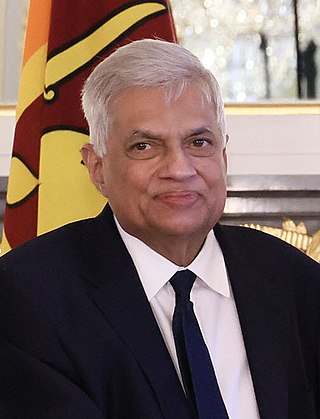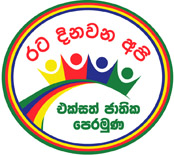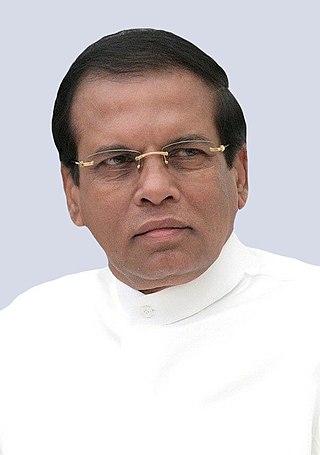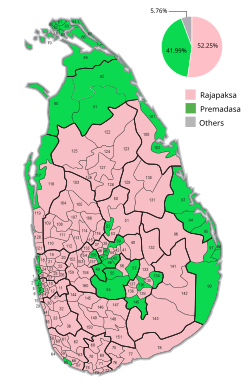
Ranil Wickremesinghe is a Sri Lankan politician who is the 8th and current president of Sri Lanka. He also holds several ministerial positions, including the Minister of Finance, Minister of Defence, Minister of Technology and Minister of Women, Child Affairs and Social Empowerment.

The United National Party, often abbreviated as UNP, is a centre-right political party in Sri Lanka. The UNP has served as the country's ruling party, or as part of its governing coalition, for 38 of the country's 74 years of independence, including the periods 1947–1956, 1965–1970, 1977–1994, 2001–2004 and 2015–2019. The party also controlled the executive presidency from its formation in 1978 until 1994.

Mahinda Rajapaksa is a Sri Lankan politician. He served as the President of Sri Lanka from 2005 to 2015; the Prime Minister of Sri Lanka from 2004 to 2005, 2018, and 2019 to 2022; the Leader of the Opposition from 2002 to 2004 and 2018 to 2019, and the Minister of Finance from 2005 to 2015 and 2019 to 2021. He has been a Member of Parliament (MP) for Kurunegala since 2015.
The United People's Freedom Alliance was a political alliance in Sri Lanka founded by former Sri Lankan president Chandrika Kumaratunga in 2004 and dissolved by former Sri Lankan President Maithripala Sirisena in 2019.

The Sri Lanka Freedom Party is one of the major and most well known political parties in Sri Lanka. It was founded by S.W.R.D Bandaranaike in 1951 and, since then, has been one of the two largest parties in the Sri Lankan political arena. It first came to power in 1956 and since then has been the predominant party in government on a number of occasions. The party is generally considered as having a democratic socialist or progressive economic agenda and is often associated with nationalist Sinhalese parties. The party follows a Non-Aligned foreign policy but always had close ties to socialist nations.

The United National Front (UNF) later the United National Front for Good Governance (UNFGG) was a political alliance in Sri Lanka led by the United National Party.

Sajith Premadasa is a Sri Lankan politician. He is the current Leader of the Opposition of Sri Lanka and Member of Parliament for Colombo District. He is the current leader of the Samagi Jana Balawegaya.

Dullas Daham Kumara Alahapperuma is a Sri Lankan politician and founder and current leader of the Freedom People's Congress. Alahapperuma is also a former Cabinet Minister of Information and Mass Media and a current Member of Parliament from the Matara District.

Parliamentary elections were held in Sri Lanka on 17 August 2015, ten months ahead of schedule, to elect 225 members to Sri Lanka's 15th Parliament.
The 15th Parliament of Sri Lanka was the meeting of the Parliament of Sri Lanka with its membership determined by the results of the 2015 parliamentary election, held on 17 August 2015. The parliament met for the first time on 1 September 2015 and was dissolved on 3 March 2020. According to the Constitution of Sri Lanka, the maximum legislative term of the parliament is 5 years from the first meeting.

The Sri Lanka People's Front, commonly known by its Sinhalese name Sri Lanka Podujana Peramuna (SLPP), is a political party in Sri Lanka. Previously a minor political party known as the Sri Lanka National Front (SLNF) and Our Sri Lanka Freedom Front (OSLFF), it was relaunched in 2016 as the SLPP and became the home for members of the United People's Freedom Alliance loyal to its former leader Mahinda Rajapaksa.
Local elections were held in Sri Lanka on 10 February 2018. 15.7 million Sri Lankans were eligible to elect 8,327 members to 340 local authorities. It was the largest election in Sri Lankan history. This was also the first election under the mixed electoral system where 60% of members were elected using first-past-the-post voting and the remaining 40% through closed list proportional representation.

A constitutional crisis began in Sri Lanka when President Maithripala Sirisena appointed former president and member of parliament Mahinda Rajapaksa as Prime Minister on 26 October 2018 before formally dismissing the incumbent Ranil Wickremesinghe, resulting in two concurrent Prime Ministers. Wickremesinghe and the United National Party (UNP) viewed the appointment as illegal, and he refused to resign.

Parliamentary elections were held in Sri Lanka on 5 August 2020 to elect 225 members to Sri Lanka's 16th Parliament. 16,263,885 people were eligible to vote in the election, 31.95% of whom were young voters.

Presidential elections were held in Sri Lanka on 16 November 2019. The incumbent President Maithripala Sirisena's term of office would have ended on 9 January 2020. This was the first presidential election in Sri Lanka where no sitting president, prime minister or opposition leader ran for president. Gotabaya Rajapaksa won the election in a landslide victory, defeating his main opponent Sajith Premadasa.

The Samagi Jana Balawegaya is a political alliance that is led by the opposition leader of Sri Lanka, Sajith Premadasa. The alliance was formed with the approval from the working committee of the United National Party (UNP) to contest the 2020 Sri Lankan parliamentary election. On 11 February 2020 the election commission of Sri Lanka announced that they have accepted the party as a recognised political party in Sri Lanka. Ranjith Mandumabandara was named as the General Secretary of the party. Jathika Hela Urumaya (JHU), Sri Lanka Muslim Congress (SLMC) and the Tamil Progressive Alliance (TPA) joined the new alliance on 12 February 2020.

The 16th Parliament of Sri Lanka is the current Parliament of Sri Lanka, with the membership determined by the results of the 2020 parliamentary election held on 5 August 2020. According to the Constitution of Sri Lanka the maximum legislative term of the parliament is 5 years from the first meeting.

The 2022 Sri Lankan political crisis was a political crisis in Sri Lanka due to the power struggle between President Gotabaya Rajapaksa and the people of Sri Lanka. It was fueled by the anti-government protests and demonstrations by the public due to the economic crisis in the country. The anti-government sentiment across various parts of Sri Lanka has triggered a state of political instability that is unprecedented in the nation's history.
The Uttara Lanka Sabhagaya or Supreme Lanka Coalition is a political alliance in Sri Lanka formed in 2022. The coalition is made up of seven Sri Lankan leftist and nationalist parties who were formerly part of the SLPP-led Sri Lanka People's Freedom Alliance, before defecting to the opposition amidst the 2022 economic crisis and political crisis. The first conference of the alliance was held on 4 September, 2022. Leader of the National Freedom Front (NFF) and former cabinet minister Wimal Weerawansa is the chairman of the Supreme Lanka Coalition. The alliance has 15 seats in the Parliament of Sri Lanka.

The Freedom People's Alliance is a political alliance in Sri Lanka founded in 2023 to contest in the upcoming local elections. The alliance consists of 12 political parties, including the Sri Lanka Freedom Party (SFLP), the Uttara Lanka Sabhagaya and the Freedom People's Congress.























